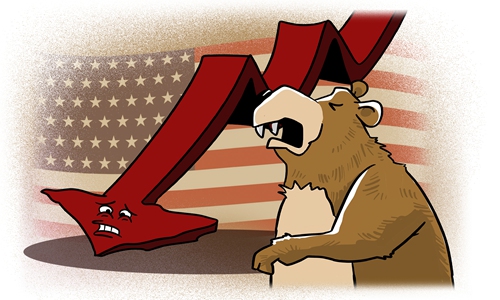HOME >> SOURCE
A bearish US stock market could be temporary
By Yin Zhongli Source:Global Times Published: 2020/3/10 21:48:40

Illustration: Luo Xuan/GT
The US economy is highly dependent on the stock market. The bearish US stock market may be temporary, which needs to be closely watched. However, if the US stock market keeps sliding down, the impact on the US economy could be huge, sending jitters to the world economy.Pension funds, personal financial assets all have ties to the stock market. Once a long-term decline forms in the US stock market, the aggregated demand will drop and its economy will run into recession. The stock market in the US has a much bigger influence on the US economy than the influence of Chinese A shares on the Chinese economy.
Despite the uncertainties, the US stock market has problems. For starters, the US stock market has been overvalued. It kept hitting record highs for 10 years till the beginning of this year. This has been its major problem.
Moreover, the sudden crash of the US stock market is also inseparable with its trading structure. The recent bullish market was largely built on companies buying back their own stocks after financing through low-cost bonds.
Index funds including exchange-traded funds (ETFs) have gained popularity. The trading of ETFs is largely based on machines and algorithms. Its flaws can hardly be spotted when the market goes up. However, amid a huge market selloff, all the programs conduct similar operation commands, creating too many transactions to process. The overcrowded transactions could eventually lead to liquidity depletion. These are the deep-level reasons for the trading halt that happened on Monday.
The spreading of the coronavirus is the trigger for the stock market plunge, and it is likely to have a key impact on the global industrial chain and global market demand. The oil price dive, which led to Monday's US stock market drop, is mainly due to shrinking oil demand amid the epidemic outbreak. This is the first wave of impact of the coronavirus on the world economy, bringing not only an oil price crash but also panic sentiment on the stock market.
If Western countries fail to stop the epidemic from spreading, there will be more of these kinds of uncertainties in the global economy and financial market. The second wave of impact could be on the global industrial chain. In a highly integrated world, no country can be exempted from a disrupted industrial chain. Once this impact starts to show, the US stock market will take a hit again. Its turbulence and panic sentiment could affect the Chinese and world stock markets.
As for China, compared to the 2008 financial crisis, the country's current debt burden has significantly increased, mounting mortgage debts on low and middle-income residents. If the coronavirus epidemic triggers large-scale unemployment, unpredictable risks might follow.
To this point, the government needs to roll out more targeted fiscal policies, such as providing special support and relief for those who are out of work due to the virus outbreak. Small businesses in the service sector that have suffered a severe blow from the epidemic need support measures including tax and fee reduction. For these issues, overall macro policies don't work well. Instead they can cause side effects. Over-relaxed monetary policies are more likely to cause a spike in asset prices, which would be harmful for low-income residents and the overall economic structure.
The author is chief economist at RiseSun Real Estate and a research fellow with the Institute of Finance and Banking under the Chinese Academy of Social Sciences. bizopinion@globaltimes.com.cn
Posted in: COLUMNISTS